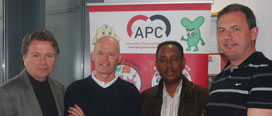2012 Press Releases
Biological warfare

Scientists in Cork have identified a novel therapy for the bacteria which cause infections in Cystic Fibrosis patients.
The research was carried out the Alimentary Pharmabiotic Centre (APC), a Science Foundation Ireland funded research centre based in UCC, Teagasc Moorepark Research Centre, and CIT.
Cystic Fibrosis is a genetic disease which is particularly common in Ireland and results in a build-up of mucous in the lungs of affected individuals. Very often this mucous can become contaminated with Pseudomonas aeruginosa. While the care of Cystic Fibrosis patients has improved dramatically in recent years, these infections remain a very difficult problem to resolve. They are difficult to treat with normal antibiotics which cannot easily gain access to the bacteria in the lungs. This usually means the patient has to take antibiotics on a continual basis, which can lead to the development of antibiotic resistant superbugs.
The APC researchers, led by Professor Colin Hill in UCC and Professor Paul Ross in Teagasc, took advantage of a method called phage therapy, which has been practiced in Eastern Europe for decades but has received relatively little attention in the West. This involves identifying and characterising bacterial viruses [phage] which can attack and kill Pseudomonas aeruginosa within minutes of initial contact. The phage 'infect' the infecting bacteria and multiply within them, leading to cell death and the release of hundreds of new phage. One of the advantages of phage therapy is that any viruses which 'find' a target multiply at the target site, generating more viruses and amplifying the therapeutic effect.
The researchers showed that their newly isolated phages could very effectively kill Pseudomonas aeruginosa in situations mimicking real infections, and could eliminate all strains of Pseudomonas isolated from Cystic Fibrosis patients. The research, which involved collaboration with Professor James Martin of McGill University in Canada, is published in mBio, a high impact journal recently launched by the American Society for Microbiology.
This research is paving the way for the development of new treatments for Pseudomonas infections in Cystic Fibrosis patients.
